
"Under Pressure" is a song by the British rock band Queen and singer David Bowie. Originally released as a single in October 1981, it was later included on Queen's 1982 album Hot Space. The song reached number one on the UK Singles Chart, becoming Queen's second number-one hit in their home country and Bowie's third, and also charted in the top 10 in more than 10 countries around the world.

Earthling is the 21st studio album by English musician David Bowie, released on 3 February 1997 through RCA Records in the United Kingdom, Virgin Records in the United States, and Arista Records/BMG in other territories. Mostly self-produced by Bowie, it was primarily recorded from August to October 1996 at New York City's Looking Glass Studios. Bowie composed the tracks with Reeves Gabrels and Mark Plati, who are credited as co-producers, with Mike Garson, Gail Ann Dorsey and Zack Alford providing overdubs later.
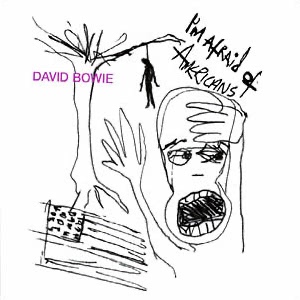
"I'm Afraid of Americans" is a song by English musician David Bowie, released as a single from his album Earthling on 14 October 1997 through Virgin Records. The song was co-written by Bowie and Brian Eno and originally recorded during the sessions for Bowie's 1995 album Outside; this version was released on the soundtrack of the 1995 film Showgirls. The song was then remade during the sessions for Earthling with his then-current band, guitarist Reeves Gabrels, pianist Mike Garson, bassist Gail Ann Dorsey and drummer Zack Alford. The remake was recorded between August and October 1996 in New York City and featured rewritten lyrics, overdubs and transposed verses. An industrial and techno track, it presents a critique of America through the eyes of a stereotypical "Johnny" and is characterised by drum patterns, synthesisers, various loops and vocal distortions.

"The Hearts Filthy Lesson" is a song by English musician David Bowie from his 20th studio album, Outside (1995), and issued as a single ahead of the album. It showcased Bowie's new, industrial-influenced sound. Lyrically, the single connects with the rest of the album, with Bowie offering a lament to "tyrannical futurist" Ramona A. Stone, a theme continued in subsequent songs. The song is also meant to confront Bowie's own perceptions about the ritual creation and degradation of art. It appears in the end credits of the 1995 film Seven.
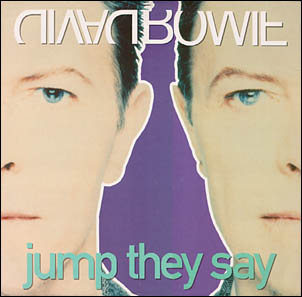
"Jump They Say" is a song by English singer-songwriter David Bowie from his 18th album Black Tie White Noise (1993). It was written by Bowie, produced by Nile Rodgers and released as the first single from the album in March 1993. While Bowie opted not to tour for the Black Tie White Noise album, the song was performed on his 1995–96 Outside Tour and released as part of the live concert No Trendy Réchauffé (2020). The accompanying music video for "Jump They Say" was directed by Mark Romanek and received heavy rotation on MTV Europe.
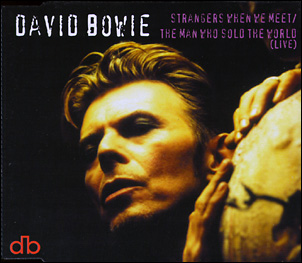
"Strangers When We Meet" is a song by English musician David Bowie, originally recorded for his 1993 album The Buddha of Suburbia. In 1995, Bowie re-recorded the song for his Outside album, and this version was edited and released as the second single from the album, paired with a reworked version of Bowie's 1970 song "The Man Who Sold the World".

"Stay" is a song by English musician David Bowie, released on his 1976 album Station to Station. The song was recorded in late 1975 at Cherokee Studios in Los Angeles. Co-produced by Bowie and Harry Maslin, the recording featured guitarists Carlos Alomar and Earl Slick, bassist George Murray, drummer Dennis Davis, pianist Roy Bittan and Warren Peace on percussion. The track features prominent dual guitar work from Slick and Alomar, who mostly composed it in the studio. Based on the chord structure of "John, I'm Only Dancing (Again)", a funk reworking of "John, I'm Only Dancing" (1972), "Stay" emulates funk rock, soul and hard rock. The song's lyrics are abstract and relate to love.

"I Can't Read" is a song written by David Bowie and Reeves Gabrels for Tin Machine on their debut album in 1989. The song was subsequently re-recorded by Bowie and Gabrels together in 1997, and performed live during Bowie's concerts in the late 1990s.
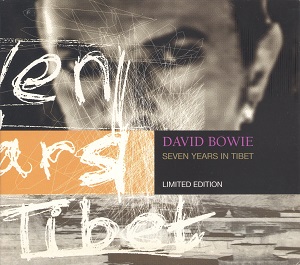
"Seven Years in Tibet" is a song and single by English musician David Bowie and Reeves Gabrels from the 1997 album, Earthling. In some territories, a version of the song sung by Bowie in Mandarin Chinese was released as "A Fleeting Moment".

"Dead Man Walking" is a song by English musician David Bowie, released as the third single from his 21st album, Earthling (1997). Written by Bowie and Reeves Gabrels, it was a number 32 hit in the UK.
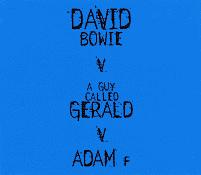
"Telling Lies" is a song by English singer-songwriter David Bowie, written and released for downloading and as a single in 1996 and later included on his 21st studio album, Earthling (1997). The song was initially an Internet-only release, and was the first-ever downloadable single by a major artist. No music video was produced for the song.

"Thursday's Child" is a song recorded by David Bowie for his twenty-second studio album Hours (1999). Written by Bowie and Reeves Gabrels, the song was released as the album's lead single on 20 September 1999, by Virgin Records.

LiveAndWell.com is a 1999 limited edition live album by David Bowie. It was not available commercially and could only be acquired by being subscribed to BowieNet at the time. The album is made up of recordings from the 1997 Earthling Tour, featuring songs from the albums Outside (1995) and Earthling (1997)

The Singles Collection is a compilation album by English musician David Bowie, released in 1993 in the UK and as The Singles 1969 to 1993 in the United States. A video companion, Bowie – The Video Collection, was released on VHS at the same time.
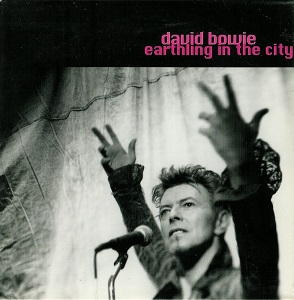
Earthling in the City is a 6-track promotional CD by David Bowie that was distributed by GQ magazine with their November 1997 issue. The disc is largely made up of live performances and remixes of songs drawn from Bowie's albums Black Tie White Noise, Outside, and Earthling.

The Earthling Tour was a concert tour by British musician David Bowie, in promotion of his album Earthling, released in 1997, The tour started on 7 June 1997 at Flughafen Blankensee in Lübeck, Germany, continuing through Europe, North America before reaching a conclusion in Buenos Aires, Argentina on 7 November 1997.

David Bowie is a box set by English singer-songwriter David Bowie, released in June 2007 by Sony Music Entertainment and Columbia Records. The box set includes expanded versions of all of Bowie's Sony-owned albums: Outside, Earthling, Hours, Heathen and Reality..
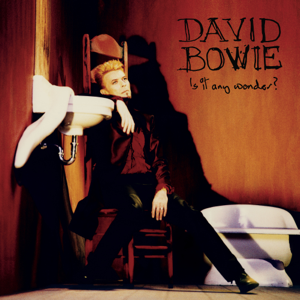
Is it Any Wonder? is a six-track EP by David Bowie that was released in early 2020. It is composed mostly of older Bowie songs that Bowie re-recorded during his Earthling (1997) recording sessions and Earthling Tour rehearsals in early 1997.

Brilliant Live Adventures [1995–1999] is a box set by English musician David Bowie, released incrementally throughout late 2020 and early 2021 as a series of six live albums taken from various concerts performed in support of Outside (1995), Earthling (1997) and Hours (1999). Named after the Hours song "Brilliant Adventure", the box set contains a mix of edited single shows and compilations from multiple concerts.

Brilliant Adventure (1992–2001) is a box set by English singer-songwriter David Bowie, released on 26 November 2021. A follow-up to the compilations Five Years (1969–1973), Who Can I Be Now? (1974–1976), A New Career in a New Town (1977–1982) and Loving the Alien (1983–1988), the set covers the period of Bowie's career from 1992 to 2001, commonly regarded by analysts as an artistic renaissance following his commercially successful but critically maligned work in the 1980s. However, Bowie's 1988–1992 tenure with the hard rock group Tin Machine is excluded. The set comprises eleven compact discs or 18 LPs.



















